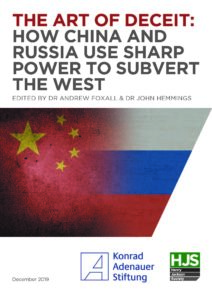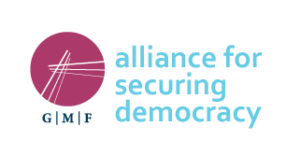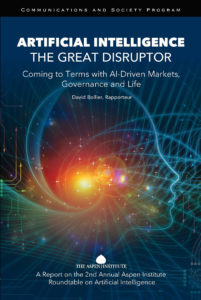One of the most deeply upsetting charts I’ve ever seen.
From this harrowing AP investigative report about China forcing birth control on Uighurs in Xinjiang to suppress their population growth: https://t.co/h91GrX3wF0 pic.twitter.com/cICPriA85L
— Simon Rabinovitch (@S_Rabinovitch) June 29, 2020
Details of China’s forced sterilizations of Uighur women are “one of the most deeply upsetting charts I’ve ever seen,” The Economist’s Simon Rabinovitch tweeted.
Some experts use starker language, the Post adds. “It’s genocide, full stop. It’s not immediate, shocking, mass-killing on the spot type genocide, but it’s slow, painful, creeping genocide,” Joanne Smith Finley, who works at Newcastle University in the U.K., told the AP.

National Endowment for Democracy (NED)
“It looks to a lot of people … like a case of at least something approximating genocide,” Chris Patten, Hong Kong’s last British colonial governor, told a Monday webinar to release a joint study — titled “Dealing with the Dragon: China as a Transatlantic Challenge” – compiled following a symposium with dozens of established China experts on both sides of the Atlantic.
To date, unlike Russian influence operations, China’s have not (yet) been targeted at meddling in and directly undermining Western democracies, their electoral institutions, or their
political processes. Rather than trying to sow discord and confusion in democracies, as Moscow has done, Beijing’s main purpose seems to be to try and influence and control perceptions of China and tilt government policies towards China-friendly positions, according the report of the Bertelsmann Stiftung, Program Germany and Asia; the Asia Society Center on U.S.-China Relations; and George Washington University’s China Policy Program.

National Endowment for Democracy (NED)
In the United States the Hoover Institution and Asia Society teamed up on a comprehensive report mapping the parameters of the CCP’s influence operations in the United States, the report adds:
The National Endowment for Democracy, Woodrow Wilson Center, Hudson Institute, Congressional committees and commissions, and other American institutions have also undertaken studies. Canada has also experienced the phenomenon of expanding Chinese influence activities. In New Zealand, scholar Anne Marie Brady has been a one-person workshop producing multiple pathbreaking analyses. But probably no other country has done more to expose the CCP’s influence activities than the media, think tanks, and individual scholars in Australia.
The consensus with a recent forum was that there needs to be much greater coordination between the U.S. and EU vis-à-vis China’s expanding role in the global governance realm, the report adds:
 “We need to be more proactive and go on offense,” one symposium participant said. Another asserted that we need a “coalition of democracies” to “counter China’s authoritarian agendas.” And all agreed that the United States needs to return to multilateralism, the global governance arena and its traditional active leadership role. Without a renewed American commitment to
“We need to be more proactive and go on offense,” one symposium participant said. Another asserted that we need a “coalition of democracies” to “counter China’s authoritarian agendas.” And all agreed that the United States needs to return to multilateralism, the global governance arena and its traditional active leadership role. Without a renewed American commitment to
the liberal system it was instrumental in building, several European participants warned that there is a real danger of a “decoupling” in global governance—with China, Russia, and other authoritarian states pushing an illiberal agenda, the EU another, and the United States losing its voice and relevance.
“It was abundantly apparent from the discussions that commonalities across the Atlantic continue to far outweigh differences,” the report adds. “The strong transatlantic commonality of values and shared democratic systems truly cements Americans and Europeans together.” RTWT

To compete with authoritarian regimes like China in AI, the United States should work with its democratic allies to develop more competitive strategies that play to its strengths, analyst Andrew Imbrie argues in Competitive Strategies for Democracy in the Age of AI, a new report from the Alliance for Securing Democracy. Based on an initial assessment of recent advances and long-term potential, it recommends that democratic nations sharpen their edge in five key areas:
- Hardware edge: exploit hardware chokepoints, leveraging the advantages that democratic nations have in the production of semiconductor manufacturing equipment and advanced AI chips.
- Data edge: develop common standards to share, pool, and store non-sensitive data sets around discrete projects, such as health intelligence and biosecurity, predictive maintenance, and maritime domain awareness; invest in privacy-preserving machine learning; and support research into new techniques for making personal data less relevant to AI systems, such as one-shot learning and advanced simulations.
-

Aspen Institute
Talent edge: develop inter-allied human capital in AI, share best practices, and cultivate democratic networks of AI researchers through exchange programs, joint scholarships, and conference support, while ensuring research security among allies and partners.
- Innovation edge: harness the estimated two-thirds of global R&D that is conducted by democratic nations to foster collaboration in specific areas of promise, such as human-machine teaming methods and verification techniques for complex controls systems and AI-enabled, safety-critical infrastructure.
- Rule-setting edge: shape global norms and standards for AI, reflecting and supporting human rights and liberal values; create the conditions for a common AI market among democratic nations; and extend the benefits of AI to fragile democracies by establishing a multilateral digital infrastructure network. RTWT







